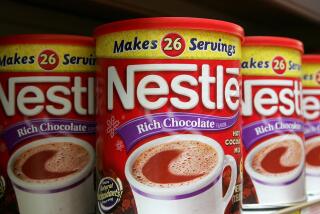Chocolate compound restores age-related memory loss
- Share via
The good stuff in chocolate brings not only good cheer and improved blood flow: A new study suggests it may have the power to turn back the clock on age-related memory loss. In research that will need to be replicated by larger trials, a concentrated daily dose of epicatechin, a compound derived from the cocoa bean, made a typical 60-year-old’s memory perform more like that of a 30- or 40-year-old.
A small trial set out to explore the effect of dietary “flavanols” on the dentate gyrus, a structure in that brain’s hippocampal region that plays a critical role in certain kinds of memory. The dentate gyrus becomes notably less active and less effective with normal aging.
A test drink that concentrated about 900 milligrams of flavanols was produced by the Mars company, maker of a wide range of chocolate candies. Nineteen subjects between the ages of 50 and 69 drank the test drink daily for three months, while 18 drank a beverage containing only 10 milligrams of the cocoa-derived flavanols.
Upon recruitment and at three months, both groups had their brains scanned and performed a memory test assessing a distinctive form of memory for novel shapes and patterns--an assessment that tests the dentate gyrus.
The research was led by Adam M. Brickman of Columbia University Medical Center’s Taub Institute for Research on Alzheimer’s Disease and the Aging Brain and builds on research by Dr. Scott A. Small at the Taub Institute. It was published this week in Nature Neuroscience.
After three months, the group that got the supercharged flavanol drink showed greatly improved performance on the test of memory, while the low-flavanol group showed no such improvement.
Researchers’ separate scans of youthful subjects, aged 22 to 41, had shown two things: that better blood flow to the dentate gyrus is linked to better performance on the test of memory for novel patterns; and that along with memory performance, blood flow to that region ebbs with age.
In the older experimental subjects, the scans showed that compared with those who drank the low-flavanol drink, those who got the high-octane flavanol beverage had notably improved blood flow in the dentate gyrus after three months.
The researchers emphasized that consuming chocolate in an effort to take in epicatechins would not be recommended: the processing of cocoa beans in the confectionery process typically strips most chocolate candy of those phytonutrients. And getting 900 milligrams of epicatechin from any flavanol-rich food would be impractical.
The study was designed also to test whether aerobic exercise, either alone or in combination with flavanols, improved memory performance and blood flow to the dentate gyrus in these older subjects. While researchers had earlier found strong evidence that aerobic exercise improves cognitive performance in younger subjects, the current study found no such effect in the 50-to-69-year-old subjects.
Epicatechin is a flavanol found plentifully in tea, wine and some fruits and vegetables, as well as in cocoa beans. The flavanols in cocoa beans are routinely destroyed by the high heat used in processing cocoa beans to make chocolate. But Mars Botanical, a research and development company owned by Mars Inc., has developed a process by which the cocoa bean’s flavanols are captured and retained.
The research was funded in part by Mars, which has an interest in exploring the health effects cocoa-based catechins. The National Institutes of Health and two foundations that support brain research also underwrote the research.
The precise formulation used in this study has also been shown to improve cardiovascular health. Brigham and Women’s Hospital in Boston recently launched a large study underwritten by NIH to see whether flavanols can help prevent heart attacks and strokes in older men and women.
Follow me on Twitter at @LATMelissaHealy and “like” Los Angeles Times Science & Health on Facebook.





